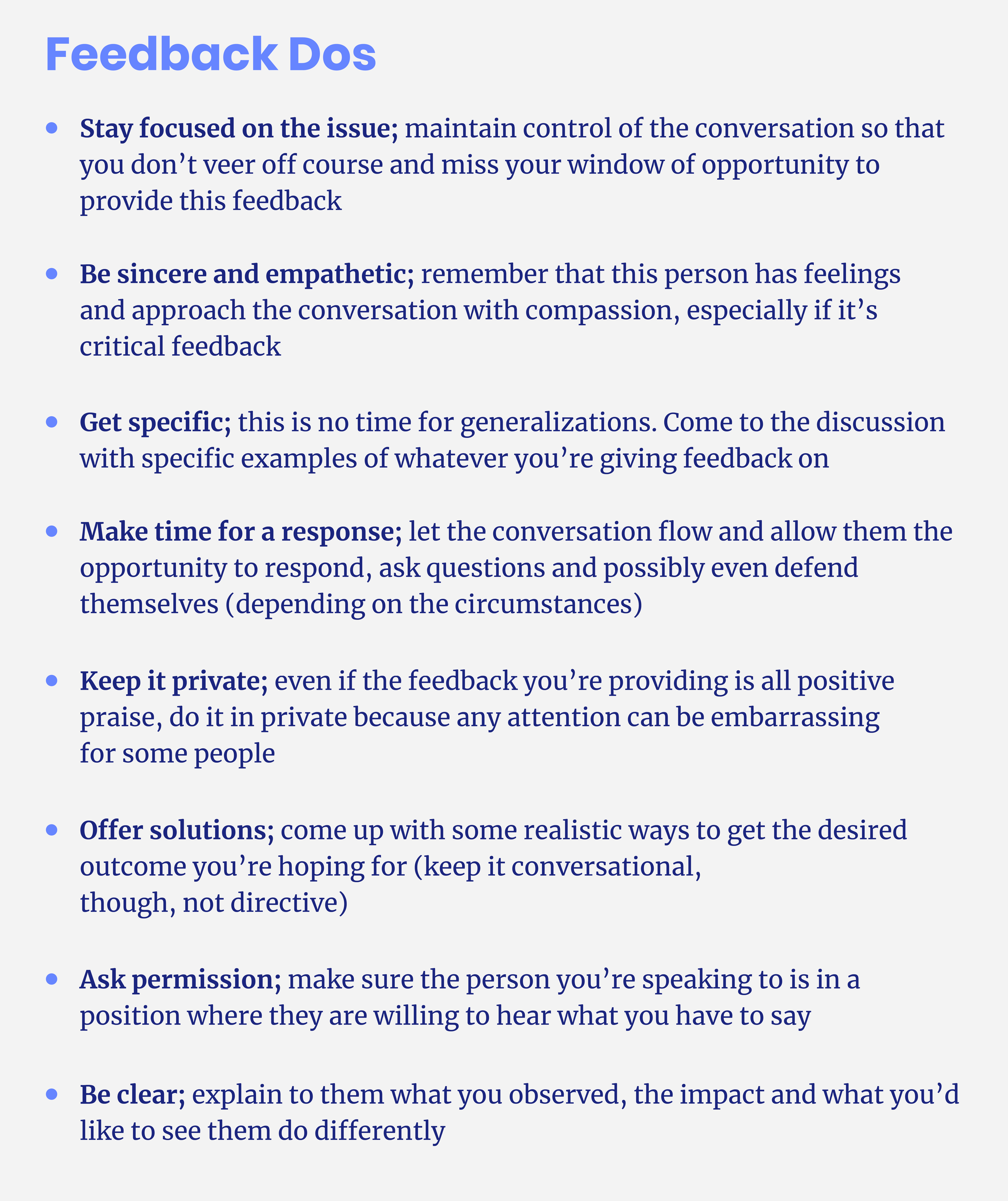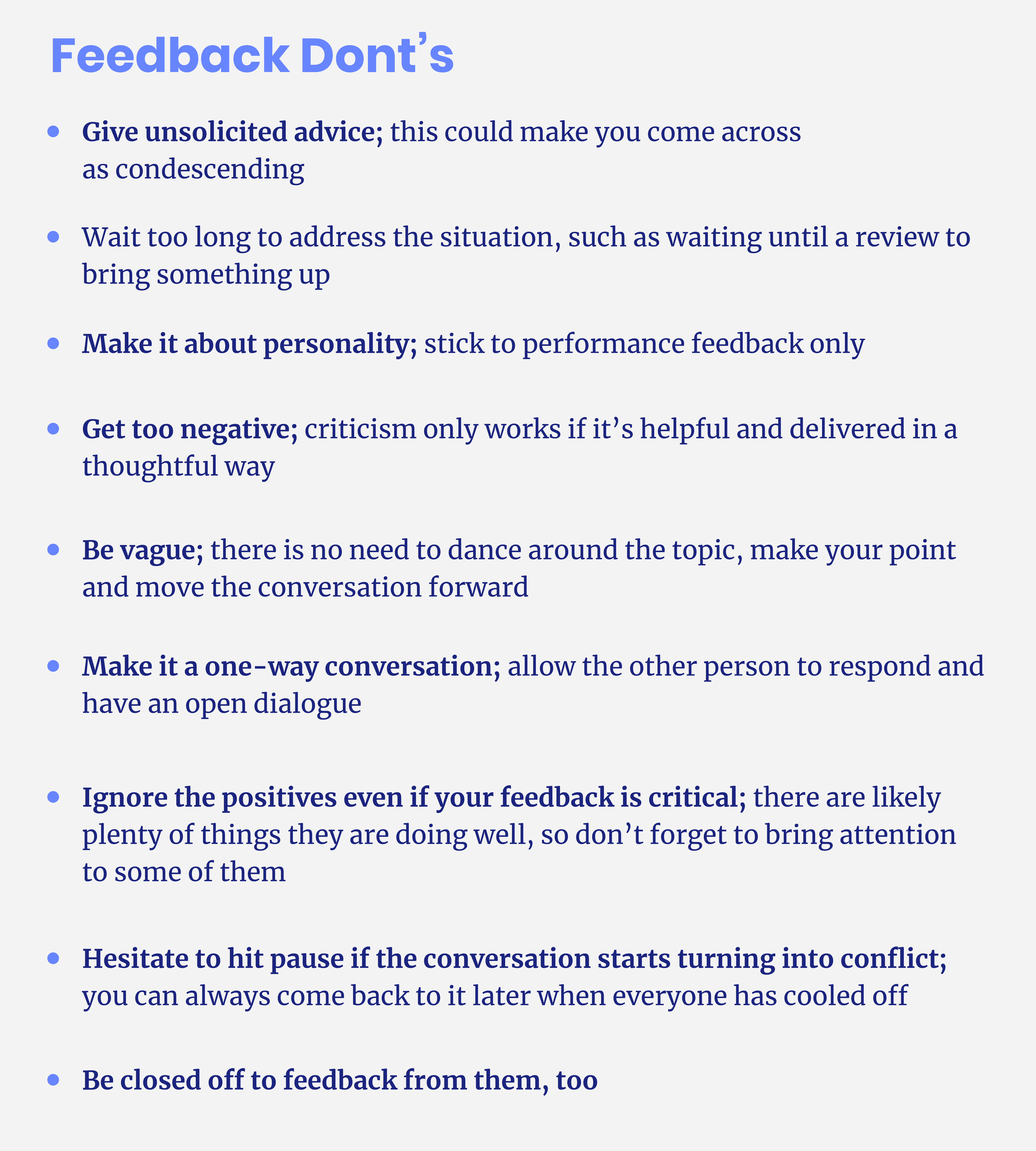More than likely, or at some point in your career, you have been on the receiving end of feedback. Maybe you were given some positive praise. Perhaps someone gave you constructive criticism. But, regardless of the message, someone still took the time to share an observation with you in hopes that it would help you improve or build on your existing success.
Feedback can be a great way to help someone, or yourself, get desired results. However, it can be tricky to deliver because for it to be helpful, the person you’re sharing it with needs to be able to take the information in without feeling criticized or (worse) threatened. It means you have to take the extra steps to ensure you are mindful of what you say, how you say it and have a specific end goal in mind. Honestly, depending on the person you’re speaking to, it can be a tough line to walk.
Why and When To Provide Feedback
There are all kinds of reasons to give feedback, and you likely do it all of the time without even realizing it. If you’re a parent, the chances are high that you give your child some feedback every day through encouragement or correction. Even though this feedback is unconscious on your end, you are probably thoughtful in how you deliver it, especially when it’s about something they need to improve upon because you want them to feel empowered, not discouraged.
Though the situations are not apples-to-apples, that same thoughtfulness should still be applied when you’re giving people within your professional network feedback, whether it’s positive or critical. It’s essential to balance where you are respecting the person and their work, valuing your relationship with them, and still getting what you need out of the situation.
Giving feedback to a peer. It is probably the easiest feedback scenario because you’re talking to someone with whom you, hopefully, have mutual respect. You are likely both working towards a similar goal, and no one has a power advantage over the other. You might find yourself giving peer feedback on a project you’re working on together, a presentation they gave to the team, or just a general observation in something they could improve upon
Giving feedback to a client. In this situation, the feedback may be a little harder to give because while there is no obvious power imbalance here, you have to be mindful about keeping your client’s business. You’ll need to find a way to be assertive without being aggressive and come to the conversation with not just an observation but also with a possible solution.
Giving feedback to a manager or supervisor. Depending on your relationship with your manager or supervisor, this may be the most challenging or uncomfortable feedback scenario. However, just because it may be nerve-wracking doesn’t mean you should opt-out of having the conversation entirely. Instead, create a rough plan of what you want to say beforehand, stay on topic during the conversation, provide solutions and approach the conversation in a way that shows you value and respect your relationship with whoever you’re speaking.
Feedback Dos and Don’ts
Since every feedback scenario calls for something a little different, there aren’t many tips that will work for every circumstance. You’ll need to assess the unique situation beforehand and figure out your best approach based on who you’re speaking to and the information you’re delivering. After you’ve done this, make use of whatever “dos and don’ts” apply to the tone you’re trying to achieve.
Do's
- Stay focused on the issue; maintain control of the conversation so that you don’t veer off course and miss your window of opportunity to provide this feedback
- Be sincere and empathetic; remember that this person has feelings and approach the conversation with compassion, especially if it’s critical feedback
- Get specific; this is no time for generalizations. Come to the discussion with specific examples of whatever you’re giving feedback on
- Make time for a response; let the conversation flow and allow them the opportunity to respond, ask questions and possibly even defend themselves (depending on the circumstances)
- Keep it private; even if the feedback you’re providing is all positive praise, do it in private because any attention can be embarrassing for some people
- Offer solutions; come up with some realistic ways to get the desired outcome you’re hoping for (keep it conversational, though, not directive)
- Ask permission; make sure the person you’re speaking to is in a position where they are willing to hear what you have to say
- Be clear; explain to them what you observed, the impact and what you’d like to see them do differently
Dont's
- Give unsolicited advice; this could make you come across as condescending
- Wait too long to address the situation, such as waiting until a review to bring something up
- Make it about personality; stick to performance feedback only
- Get too negative; criticism only works if it’s helpful and delivered in a thoughtful way
- Be vague; there is no need to dance around the topic, make your point and move the conversation forward
- Make it a one-way conversation; allow the other person to respond and have an open dialogue
- Ignore the positives even if your feedback is critical; there are likely plenty of things they are doing well, so don’t forget to bring attention to some of them
- Hesitate to hit pause if the conversation starts turning into conflict; you can always come back to it later when everyone has cooled off
- Be closed off to feedback from them, too
Stay Focused On The Goal
Regardless of the circumstances or who you’re giving feedback to, remember to stay focused on your desired outcome during the conversation. It will allow you to quickly address the situation before moving the conversation forward to finding possible solutions rather than emphasizing criticism or negativity. Remember, chances are high that you’re both after a similar goal, so approach the conversation with a problem-solving mindset so that you can work together to find a good solution.
Join a community that cares
The Mom Project supports women throughout their working motherhood journey. Search for career opportunities with vetted, family-friendly employers, and get access to job search tools, career development resources, and a thriving community of moms and allies. 





